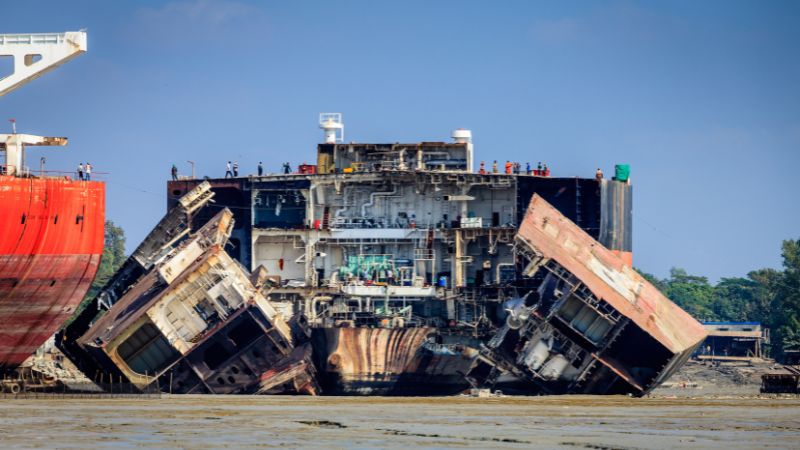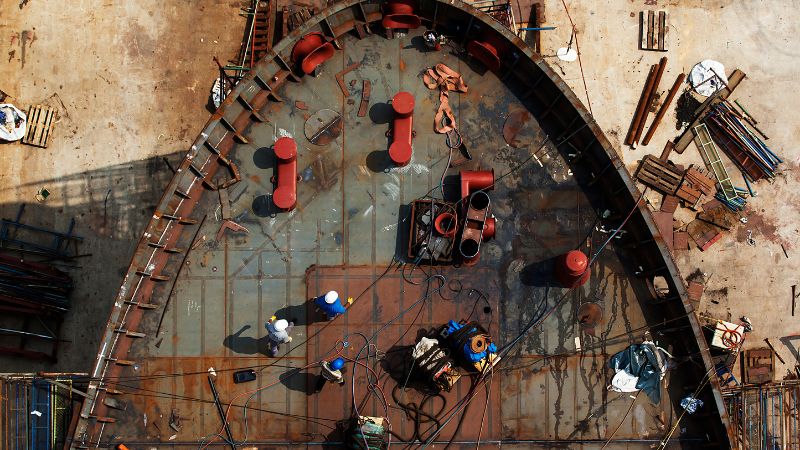
Shahenoor Akther Urmi : Nizam Uddin, a 50-year-old farmer, is having a tough time deciding what to do next. For the past few years, he’s been losing money on his rice crops, and he’s not sure if it’s worth it to keep trying.”
He has been farming paddy for about 15 years now. He started doing it when he came back from working in the Middle East. His father was also a farmer in this village of Akilpur, which is on the outskirts of Kumira Sitakunda in Chittagong.”
A father of four, Nizam says it’s getting hard to make a profit. There’s not enough fresh water, especially during the dry season, and the cost of things like fertilizer and pesticides is skyrocketing. He’s basically putting in more money than he’s getting back.
He also complains about the pollution in the water they use for farming. “It’s black and dirty,” he says. “It makes our skin itchy when we work in it. And sometimes, during the dry season, when the tide comes in, black oil gets into the rice fields too.”
This correspondent talked to several other farmers in Akilpur, and they all had the same story. They’re losing money every year. Some of them have even had to sell their family’s land to other people who want to use it for fish farming or dairy farming.
In a bid to figure out why the farmers were losing money and why their crops weren’t doing as well. It was found that the water they use for irrigation is dirty because of black oil.
It turns out that the oil was coming from Sitakundu, a town in Bangladesh where a lot of ships are broken down, has been dumping toxic waste into the ocean. This has killed a lot of sea creatures and made the soil less fertile.
The water around the ships was black, and there was black dust mixed in with the sand.
Despite the industry’s abysmal safety record, fatalities in shipbreaking yards are commonplace, resulting from gas explosions, falls from partially dismantled ships, or being struck by broken steel and furniture.
Some deaths occur through a more insidious process. Bangladesh’s over 140 shipbreaking yards dismantle one out of every five ships on Earth.

Environmental pollution has been largely overlooked by both the concerned authorities and the local population, who rely on agriculture for their livelihoods.
Toxic gases, oil, and chemicals have depleted soil fertility, yet these issues remain largely unaddressed by the authorities.
During the visit, the correspondent observed a marked change in the seawater’s color, with some water bodies visibly contaminated with rust and waste.
Several motorized boats were seen dumping oil-tainted water directly into the sea. This marine area serves as a crucial waterway for SandwipUpazila, as numerous motorized boats await passengers here.
According to regulations, all shipyards are mandated to maintain an Effluent Treatment Plant (ETP) on-site. However, research suggests that the absence of ETPs for proper waste management and the practice of dumping oil into the sea are contributing factors to water pollution. Contaminated irrigation water can lead to the loss of soil nutrients, fertility, and other environmental hazards.
Dr. Prabal Barua, a decade-long researcher on the environmental impacts of shipbreaking, highlighted the indiscriminate disposal of hazardous waste during the scrapping process. He emphasized that shipbreaking activities have adversely affected the physicochemical properties of seawater, intertidal sediments, and soils, as well as Bangladesh’s biodiversity.
Dr. Barua explained how the industry silently depletes soil nutrients in adjacent areas. He noted that the heavy metal rust from ships is non-degradable and can persist in the soil for years.
To understand the Environmental Department’s response to pollution incidents, the correspondent examined departmental data from 2022 to 2024. During this period, four, nine, and three shipbreaking yards were fined for violating industry regulations, respectively. Each shipyard is required to submit a quarterly clearance report, focusing on air, sound, and oil emissions. Non-compliance with these standards results in fines.
In 2023, OWW Trade and Ship Breaking, located in Kumira, SitakundaUpazila, was fined twice. The first fine was imposed for illegal sand extraction, while the second was related to pollution caused during ship dismantling activities.
Despite attempts to contact the organization, they declined to comment on the matter. The shipyard claims to have implemented an Oil-Water Separator machine to separate oil-contaminated water. Following inspections, any environmental violations are addressed with fines and oversight.
Residents of Sitakundaupazila allege that some ships clandestinely release oil into the sea at night, resulting in various forms of pollution. During a visit to Akilpur, the shoreline was marred by black sand, and the water was littered with dead fish and seashells.
M. Hasan Hasibur Rahman, Director of the Chittagong Division Environment Department, confirmed these allegations, stating that several local inhabitants had reported similar concerns in the Sitakunda area.
When asked to identify the culprits, Hasibur admitted the difficulty of pinpointing the specific ship responsible for the oil spill and determining who violated regulations. With over 140 shipyards in the region, some of which operate suboptimally due to financial constraints or lack of environmental clearances, identifying the offender is challenging.
Referring to the Hong Kong Convention (HKC) of 2023, which was extended in 2025, Hasibur explained that any ship entering Bangladesh without a clearance certificate will be subject to third-party inspections, including environmental assessments and international organization oversight.

Bangladesh’s constitution enshrines environmental safeguards, and the country is a signatory to the HKC, which mandates stricter environmental safety standards for shipbreaking industries.
Bangladesh has enacted five laws governing the safe and environmentally responsible recycling of ships, addressing environmental concerns and worker safety.
To assess the effectiveness of these laws and regulations in mitigating environmental pollution and addressing past damage, the correspondent inquired with Rizwana Hasan, Advisor for Environment, Forest, and Climate Change. Hasan acknowledged ongoing efforts to address the shipbreaking industry and environmental pollution issues.
She highlighted two key areas of focus: worker safety regulations within the industry and environmental protection measures. Both aspects are deemed critical for sustainable practices.
Rizwana, who used to be the Executive Director of the Bangladesh Environmental Lawyers Association (BELA) before accepting the post of an advisor (minister) of the newly formed government, asserted that her government is actively working to enforce the two regulations aimed at mitigating environmental pollution and crises.
However, the pressing concern remains for the farmers and agricultural lands, which have already suffered damage, and the growers who continue to incur losses. How can the soil be revitalized, and agricultural production be increased?
The correspondent engaged with the local Agriculture Office, where farmers expressed frustration with the lack of outreach. They indicated that government officials rarely visit them proactively, and that farmers must initiate contact with specific solutions in mind.
M. Habibullah, the Upazila Agriculture Officer of Sitakunda Upazila, acknowledged that farmers do not frequent their office, typically seeking assistance only when confronted with crop diseases. He explained that the office provides disease-specific medicine recommendations based on availability but does not actively reach out to farmers for further information regarding farmland conditions and disease outbreaks.


